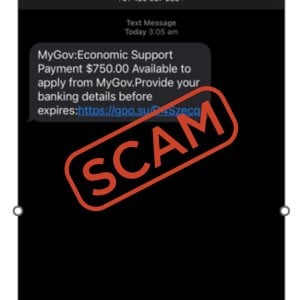Alert! Aussies warned against new myGov scam
The Australian government's digital service platform, myGov, is a popular target for scammers trying to steal personal information and money.
With over 20 million Australians using the platform to access tax returns, Medicare, Centrelink and other services online, scammers have a huge pool of potential victims.
Scamwatch recently warned of a new text message scam claiming to be from myGov and offering recipients $750 in ‘economic support payments’.
To 'apply', users are instructed to click on a link and provide their banking details before the 'support' expires.
Scamwatch wrote in a social media post: ‘myGov will never ask you to click a link to sign in to your account or to enter your bank details or ID docs. Don't click links. Use the secure myGov app to check your account. Report scams to Scamwatch.’
This is just the latest in a long line of phishing scams aimed at unsuspecting myGov users. Experts say the large user base and sensitive personal data associated with myGov accounts make them attractive targets.
Some common myGov scams include fake 'account verification' emails and texts with links to fake login pages designed to steal usernames and passwords.
One sample of this email was sent by our member @Maurice F. last month. The email stated that the ‘refund is ready’ and asked the recipient to sign in by clicking the link provided. You can read more about that story here.
Scammers may also impersonate myGov via phone calls, asking for personal details like birthdates and addresses under the guise of 'updating records'.
In 2022, Australians lost a staggering $3.1 billion to scammers, with many losses from phishing attacks and social engineering scams. This is an 80 per cent increase from the scams recorded in 2021.
The highest loss came from investment scams (which cost Aussies $1.5 billion), followed by remote-access scams ($229 million) and payment-redirection scams ($224 million).
The Australian Competition and Consumer Commission (ACCC) advised that suspicious communications should be deleted immediately.
To stay safe, experts advise caution with all digital communications regarding myGov, especially those requesting urgent action. Double-check web addresses in links and manually navigate to my.gov.au.
Use the official myGov app when possible, and never provide sensitive info via phone, text, or email.
With scammers deploying increasingly sophisticated tactics, maintaining vigilance online is more important than ever.
Secure your myGov account by enabling two-factor authentication and strong, unique passwords. Scrutinise any unusual activity and contact myGov directly with concerns.
By being informed and proactive, Australians can help protect themselves from fraudsters misusing trusted services like myGov.
Stay alert online, and don't take the bait on suspect links or requests. Your personal data and money may depend on it!

If you ever receive a suspicious message, be sure to contact your bank and local authorities immediately.
You can also visit our Scam Watch forum to learn more about other scams.

Have you received a similar message, members? Let us know in the comments below!
With over 20 million Australians using the platform to access tax returns, Medicare, Centrelink and other services online, scammers have a huge pool of potential victims.
Scamwatch recently warned of a new text message scam claiming to be from myGov and offering recipients $750 in ‘economic support payments’.
To 'apply', users are instructed to click on a link and provide their banking details before the 'support' expires.
Scamwatch wrote in a social media post: ‘myGov will never ask you to click a link to sign in to your account or to enter your bank details or ID docs. Don't click links. Use the secure myGov app to check your account. Report scams to Scamwatch.’
This is just the latest in a long line of phishing scams aimed at unsuspecting myGov users. Experts say the large user base and sensitive personal data associated with myGov accounts make them attractive targets.
Some common myGov scams include fake 'account verification' emails and texts with links to fake login pages designed to steal usernames and passwords.
One sample of this email was sent by our member @Maurice F. last month. The email stated that the ‘refund is ready’ and asked the recipient to sign in by clicking the link provided. You can read more about that story here.
Scammers may also impersonate myGov via phone calls, asking for personal details like birthdates and addresses under the guise of 'updating records'.
In 2022, Australians lost a staggering $3.1 billion to scammers, with many losses from phishing attacks and social engineering scams. This is an 80 per cent increase from the scams recorded in 2021.
The highest loss came from investment scams (which cost Aussies $1.5 billion), followed by remote-access scams ($229 million) and payment-redirection scams ($224 million).
The Australian Competition and Consumer Commission (ACCC) advised that suspicious communications should be deleted immediately.
To stay safe, experts advise caution with all digital communications regarding myGov, especially those requesting urgent action. Double-check web addresses in links and manually navigate to my.gov.au.
Use the official myGov app when possible, and never provide sensitive info via phone, text, or email.
With scammers deploying increasingly sophisticated tactics, maintaining vigilance online is more important than ever.
Secure your myGov account by enabling two-factor authentication and strong, unique passwords. Scrutinise any unusual activity and contact myGov directly with concerns.
By being informed and proactive, Australians can help protect themselves from fraudsters misusing trusted services like myGov.
Stay alert online, and don't take the bait on suspect links or requests. Your personal data and money may depend on it!
Key Takeaways
- Scamwatch reported a new text message scam asking users to hand over their banking details on the promise of a $750 payment.
- The scam, which impersonates government agency myGov, claims to offer recipients an 'economic support payment'.
- The Australian Competition and Consumer Commission’s Scamwatch has warned against this scam and reminded users that myGov will never ask them to click links via text messages.
- Last year, Australians lost a record $3.1 billion to scammers, a rise of 80 per cent from the previous year, with investment scams being the highest-loss category.
If you ever receive a suspicious message, be sure to contact your bank and local authorities immediately.
You can also visit our Scam Watch forum to learn more about other scams.
Tip
If you suspect a scam or believe you may be the victim of fraud, report it online at https://www.scamwatch.gov.au/report-a-scam.
Have you received a similar message, members? Let us know in the comments below!









